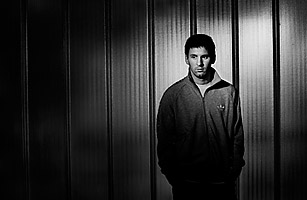Journalists are evenly split on whether or not they should interview their personal heroes: some say you shouldn't because you'll find your idol has feet of clay, others argue the opportunity is too good to miss. For me, it was a no-brainer. Lionel Messi is not only the shining star of my favorite team, FC Barcelona, (although among my sentimental favorites, he ranks behind stalwarts Carles Puyol, Xavi Hernández and Andres Iniesta) he's also a highly unusual sporting icon. In an era when many sports celebrities swagger extravagantly, on and off the field, Messi is something of a throwback: a well-behaved young man who keeps his nose scrupulously clean.
On the field, he shows little of the petulance and amateur dramatics of so many soccer players, including one or two in Barcelona colors. When he scores, he always raises two forefingers to the sky, dedicating the goal to his late grandmother. When he's fouled, he rarely — rarely — exaggerates his pain: he's too much in a hurry to get the ball back at his feet. Off the field, he lives a quiet life, with his father in the Barcelona suburb of Castelldefels. Unlike many top players (including some of his recent teammates), he's rarely seen in the city's bars and discos, with a supermodel on his arm.
Lionel Messi of FC Barcelona, photographed Jan. 11, 2012
Joachim Ladefoged / VII for TIME
I had been warned that he was not a great interview. For one thing, he is naturally reticient; for another, modern sportsmen are taught by PR experts and lawyers to regard every question from a journalist as booby-trap, to be treated with maximum caution. In dozens and dozens of Messi interviews I scanned through, he had said little that was revealing.
When Lisa Abend and met him, I could tell Messi was on his guard, like a phalanx of Italian defenders playing catenaccio. He made little eye contact, and spent much of the time tightly clutching, with bothhands, the bottom of his chair. I can't truthfully say we broke down his defences, but we did get a flash or two of candor, which is rare in a Messi interview. You be the judge.
On how he judges his own success:
I don't know. Everythime I start a year, I start start with the objective of trying to achieve everything, without comparing it to how I've done in other seasons, to what I've accomplished before, or to what we've accomplished as a group. For me, what's happened has happened, and I'm always looking toward what's ahead. You don't have time to stop and think about everything that happens, it all happens too quickly. When I retire, I'll stop and think about that.
On how his skills have evolved:
I can't really say. Year after year, I've grown, improved. I was lucky to start very young and always have very good colleagues around me as I was coming up, and this has helped me and how I play. And with [Barcelona coach Pep] Guardiola, I learned to play tactically, which is what I most needed, what my game needed. From the tactical point of view, it's been about knowing how to stop [to think] on the field when we don't have the ball. And that makes us better when we have it.
On his low-key lifestyle:
I've always been this way, ever since I was young. I've always really just liked football, and I've always devoted a lot of time to it. When I was a kid, my friends would call me to go out with them, but I would stay home because I had practice the next day. I like going out, but you have to know when you can and when you can't. That's why I say nothing's changed since I was young. My friends would go out and I'd stay home. But not for nothing, because I knew it had to be that way, and at that moment, I was dedicated to football.
On whether he's had to sacrifice fun in the pursuit of excellence:
I never thought that. I always thought I wanted to play professionally, and I always knew that to do that I'd have to make a lot of sacrifices. I made sacrifices by leaving Argentina, leaving my family to start a new life. I changed my friends, my people. Everything. But everything I did, I did for football, to achieve my dream. That's why I didn't go out partying, or a lot of other things.
On his first experiences at Barcelona's famous 'La Masia' training school:
It helped me a lot because I came [from Argentina] alone, and I was with all the guys in the Masia, I was one of them. We were all from someplace else, and we helped each other. The truth is that there were a lot of happy moments, because we were there together for a lot of time, and the relationships between all of us got stronger and stronger. Lots of happy times.
On his preparations for the next World Cup, and what he learned from the last one:
I'm preparing now like I would for any match, any important match whether its the World Cup or Champions League, or the Copa del Rey. I play all games the same, as if they were all finals. Nothing changes in my preparations.
On whether playing for Argentina in the World Cup brought a different kind of pressure:
No, we feel pressure with every match: not just me, but anyone who's on a national team. What I can say that I learned [in the 2010 World Cup in South Africa] is that the most important thing is that the team be strong, that they be united. That's what's important in a tournament that is so short.
On whether his rivalry with Real Madrid's Cristiano Ronaldo makes him a better player:
I don't think so. I never really fixated on him, or compared myself with another player. My mentality is just to achieve more each year, to grow both as an individual and as a team, and if he wasn't there, I'd be doing the same thing.
On what he thinks of Ronaldo:
I think he's a good person. I think he's a good player, who brings a lot to Madrid, and who, in any moment, can decide a game.
On whether, when Ronaldo scores in a game, he feels pressure to do likewise:
No. I care about how Madrid's doing because they're competing against us, and they're in our League, and because almost every year, we compete for the title. But against Ronaldo, no.
On his competitiveness, and how he feels when he loses:
I am competitive and I feel bad when we lose. You can see it in me when we've lost. I'm in a bad way. I don't like to talk to anyone. I just retreat into myself and go over the game in my head: the things that went wrong, what I did wrong, why we didn't win.
On how long he broods:
Until the next game. Luckily we play a lot, so it happens quickly.
On how he feels when criticized by fellow Argentines for his performances with the national team:
Yes, yes, it hurt, it bothered me. Because they said things that weren't true — that I didn't care as much about wearing the [Argentine] shirt. I didn't feel that, I didn't think that. And now, I think what people there understand that this is a team game, and that I try to play the same way there as I do in Barcelona, and always do the best I can.
On his strong identification with Argentina, despite having lived in Barcelona since age 12:
I've never stopped being Argentine, and I've never wanted to. I feel very proud of being Argentine, even though I left there. I've been clear about this since I was very young, and I never wanted to change. Barcelona is my home because both the club and the people here have given me everything, but I won't stop being Argentine.
On why he feels his countrymen are finally warming to him:
You see it in the affection that people there have, for what they say on television. Before, there was a lot of criticism and everything was bad. And now it's not like that. That's good, because every country I go to, people have always received me very well, and in my own country that wasn't happening.
On the reception he gets from fans around the world, like in Kolkata, India, where he recently played:
Incredible. It's happened in a lot of countries I've visited, but it's still surprising. I never imagined that so far from Spain or Argentina, people would have this affection for me. It makes me very happy.
On whether this adulation puts more pressure on him to score:
No, I play the same as always. Whether it's a friendly match, or for points, or a final, or any game — I play the same. I'm always trying to be my best, first for my team, for myself, for the fans, and to try and win.
On the qualities of his teammates that he admires:
I haven't changed my values, the values that I learned from my family. They're the same ones I brought to Barça, to the club, that the guys in charge at La Masia teach to the kids: respect, humility, collegiality, respect one another no matter who he is.
On the World Cup 2014, and whether it will be his moment to silence his critics:
I hope so. I hope it's the moment for Argentina, and that we can become champions. I'm going [to Brazil] because I want to be a champion and share the World Cup with my national team. But if it doesn't turn out that way, I can't do anything about it. And there's still a lot of time. There's still a lot of time to prepare and to improve.
Fuente: Time

















Publicar un comentario
(-^o^-) (^_-) (#^_^#) (ÖoÖ) (*^o^*) (>_<) ( ̄へ ̄)(;_・) (ô_Ó) (O_O) (ˇ~ˇ) (ToT)(Q____Q) ಠ_ಠ (。◕‿◕) [(--)]ZZzzz
- Si el comentario es anónimo hay muchas posibilidades que no se publique.